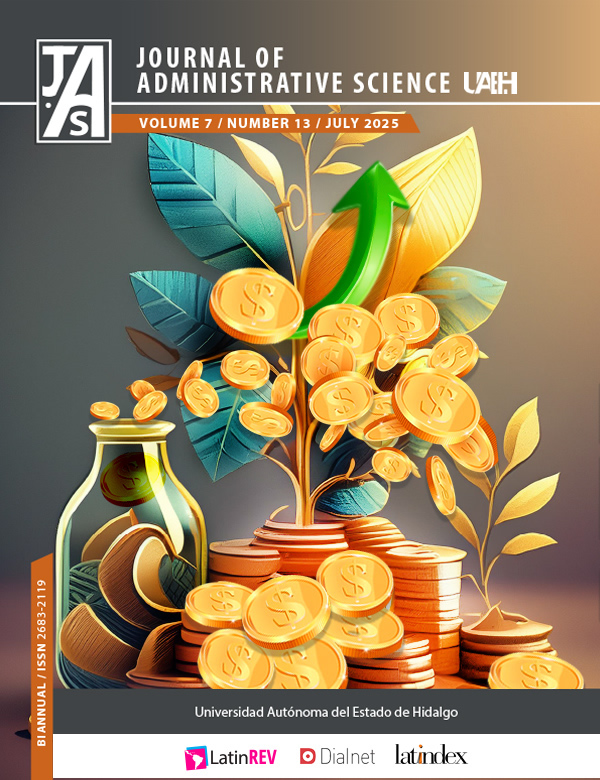Type A Behavior in Workers at a Mexican Health Center
DOI:
https://doi.org/10.29057/jas.v7i13.14321Keywords:
Type A behaviour, workers, stressful situations, time, motivationAbstract
Type A behaviour is an action-emotion behaviour pattern observed in workers who strive to achieve more things related to their work in less time, even under adverse circumstances. The study presented aims to understand the behavioural behaviour of type A workers who work in the health field in relation to the number of patients they serve on a daily basis, all with the purpose of verifying whether there is any relationship between this attitude and their workload. The main results show that there is a positive correlation between the dimensions Ambition and Activity when the workload is High, so it is necessary to implement preventive programs that Favor the reduction of the risk of stress and promote a better quality of life for this group of professionals.
Downloads
Publication Facts
Reviewer profiles N/A
Author statements
Indexed in
- Academic society
- N/A
- Publisher
- Universidad Autónoma del Estado de Hidalgo
References
Lampropoulos, G., Anastasiadis, T., Siakas, K. & Siakas, E. (2022). The impact of personality traits on social media use and engagement: An overview. International Journal on Social and Education Sciences, 4(1), 34-51. https://doi.org/10.46328/ijonses.264
Petticrew, M. P., Lee, K., & McKee, M. (2012). Type A behavior pattern and coronary heart disease: Philip Morris’s “crown jewel. American Journal of Public Health, 102, 2018-2025. https://doi.org/10.2105/AJPH.2012.300816
Samaras, A. & Galanakis, M. (2022). Type A and Type B Personality Types: An Evaluation in the Modern Organizational Psychology Scope. Psychology Research, 12(12), 951-956. https://doi.org/10.17265/2159-5542/2022.12.006
Salgado-Fuentes, C., Zayas, E., Torrecillas-Venegas, R., Pérez, K., Vitón, A. & Hernández, E. (2021). Caracterización del patrón de conducta tipo A en estudiantes universitarios de ciencias médicas. Editorial de Ciencias Médicas, 9(3), 1-10. https://revcalixto.sld.cu/index.php/ahcg/article/view/e829/747
Aabida, A., Dahar, M. & Yousuf, M. (2019). Influence of Type A and Type B personality on academic achievement of university students. Global Social Sciences Review, 4(2), 80-87. https://doi.org/10.31703/gssr.2019(iv-ii).11
Yavuz, N. & Kayhan, A. (2020). Presenteeism: A research on Type A and Type B personality and demographic features. İstanbul Ticaret Üniversitesi Sosyal Bilimler Dergisi, 19(37), 77-89. https://dergipark.org.tr/en/pub/iticusbe/issue/54570/743699
Vargas, L. (2020). Patrón de conducta Tipo A y estrés (tesis de maestría). Universidad Señor de Sipán. Lima, Perú.
Belmonte, G., Ruiz, R. & Herruzo, J. (2016). Patrón de conducta de tipo A y B, y su relación con las adicciones conductuales. Acción Psicológica, 13(1), 119-128. http://dx.doi.org/10.5944/ap.13.1.17430
Šmigelskas, K. (2016). Type A behavior pattern. Japanese journal of clinical medicine, 1(1), 1114-1121. https://doi,org/10.1007/978-3-319-28099-8
Weiss, H. (2002). Deconstructing job satisfaction: Separating evaluations, beliefs and affective experiences. Human Resource Management Review, 22, 173-194. https://doi.org/10.1016/S1053-4822(02)00045-1
García, M., Moreno, G. & Rivero, L. (2013). Presencia de conducta tipo “A” que refieren Friedman y Rosenman en enfermeras de hospitales de México. Enfermería Neurológica, 12(3), 147-152. http://www.medigraphic.com/enfermerianeurologica
Glass, D., Snyder, M., Holus, J. (1974). Time urgency and the Type A coronary- prone behavior pattern. Journal of Applied Social Psychology, 4, 125-140. https://doi.org/10.1111/j.1559-1816.1974.tb00663.x
McGregor, L., Eveleigh, M., Syler, J. & Davis, S. (1991). Self-perception of personality characteristics and the Type A behavior pattern. Bulletin of the Psychonomic Society, 29(4), 320-322. https://link.springer.com/content/pdf/10.3758/BF03333931.pdf
Tadayon, R. & Sadegh, M. (2012). Bandura’s Social Learning Theory & Social Cognitive Learning Theory. Disponible en: https://davidamerland.com/images/pdf/BandurasTheory.pdf
Garcia-Sorrentino, H. & Fantin-Salas, M. (2014). Patrón de conducta Tipo A en trabajadores de la Ciudad de San Luis, su relación con actitudes disfuncionales. Journal of Behavior, Health & Social Issues, 5(2), 131-142. ttp://dx.doi.org/10.22201/fesi.20070780.2013.5.2.34951
Chilicka, K., Rogowska, A., Szyguła, R. & Adamczyk, E. (2020). Association between Satisfaction with Life and Personality Types A and D in Young Women with Acne Vulgaris. International Journal of Environmental Research and Public Health 17(22), 8524. https://doi.org/10.3390/ijerph17228524
Taboada-Vázquez, A., Gonzalez-Rodriguez, R. Gandoy-Crego, M.C. (2021). Personality Variables as Predictors of Health Services Consumption. International Journal of Environmental Research and Public Health 18(10), 5161. https://doi.org/10.3390/ijerph18105161
Downloads
Published
How to Cite
Issue
Section
License
Copyright (c) 2025 Tirso Javier Hernández Gracia, Danae Duana Avila, Roberto Estrada Bárcenas

This work is licensed under a Creative Commons Attribution-NonCommercial-NoDerivatives 4.0 International License.

















